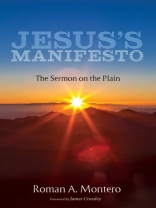Jesus’s Manifesto: The Sermon on the Plain is a historical analysis and exegesis of the Sermon on the Plain found in Luke 6:20-49. Going into the historical and literary context of the Sermon on the Plain, it examines how the message fits into the world of Jesus and his audience. Jesus’s Manifesto demonstrates how the Sermon’s ethical injunctions and eschatological message interacted with contemporary ideologies, and how these injunctions were meant to be taken as normative commandments by Jesus in light of his eschatological message. Many have attempted to dampen the ethical teachings of Jesus by trying to relativize them, or by trying to make them compatible with the wider culture and the dominant ideologies; however, when understood in its historical context, the Sermon’s message was not only incompatible with the wider culture and the dominant ideologies, but it stood in opposition to them. Jesus’s Manifesto provides the necessary historical and anthropological tools to fully appreciate the profound and seemingly radical message of the Sermon of the Plain.
O autorze
Roman A. Montero spends way too much time studying early Christianity, Koine Greek, early Christian texts, and the historical context of second temple Judaism; All Things in Common is a result of a few years of doing that.












